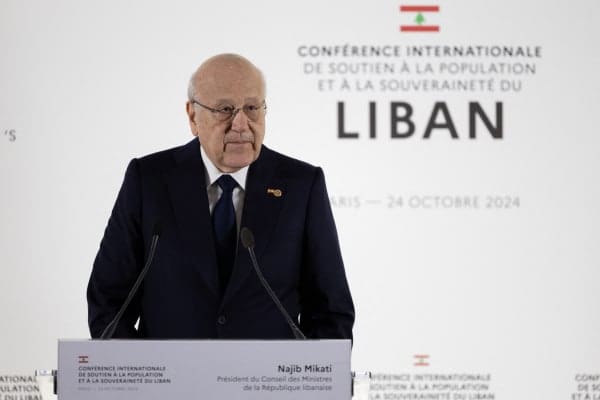Lebanon’s caretaker Prime Minister Najib Mikati speaks during a press conference at an international aid conference in support of Lebanon in Paris, France, Oct. 24, 2024. Photo by Raphael Lafargue/ABACAPRESS.COM
Amid a concerted push for a ceasefire between Israel and Hezbollah terrorist organization – led by the United States – Lebanon’s caretaker prime minister, Najib Mikati, expressed great hope about its chances for success. U.S. envoy Amos Hochstein is en route to Israel to finalize the deal.
On Wednesday, Israel’s Kan News published a leaked draft outline of the ceasefire deal. According to the document, the ceasefire will begin with a 60-day adjustment period. Israel would withdraw its troops within the first week to be replaced by some 10,000 troops of the Lebanese Armed Forces (LAF) with the cooperation of the UNIFIL peacekeeping force.
חשיפה בכאן 11: זוהי טיוטת ההסכם המלא שמתגבש בין ישראל ללבנון. ההסכם נוסח ע״י המתווך האמריקני עמוס הוכשטיין, והונח על שולחנה של ישראל. בכירים ישראלים אומרים שהדרג המדיני מרוצה מהטיוטה וסיכוייו גבוהים. הנה הטיוטה המלאה> pic.twitter.com/39sZianq8m
— Suleiman Maswadeh סולימאן מסוודה (@SuleimanMas1) October 30, 2024
According to the proposal, the Lebanese army would also dismantle and confiscate all non-state military infrastructure, i.e. the remaining Hezbollah infrastructure, in southern Lebanon.
Following the first 60 days, the United States will mediate indirect negotiations between Israel and Lebanon to establish a full implementation of UN Resolution 1701 and address unresolved border issues.
To fulfill Israeli demands for a robust enforcing mechanism, the agreement states that the Israeli Air Force will be able to conduct intelligence flights, provided they are invisible to the naked eye and do not break the sound barrier.
If it identifies violations of the agreement, Israel “may choose to act against violations” and be allowed to respond to threats emanating from Lebanese territory.
For example, if the other parties fail to prevent Hezbollah weapons shipments or renewed manufacturing, following coordination with the U.S., Israel reserves the right to carry out strikes in response to any violations.
To monitor the agreement, the U.S. will lead a newly created “International Monitoring and Enforcement Mechanism” (IMEM) with participation from Italy, France, Germany, Spain, the United Kingdom, UNIFIL and other countries in the region.
Speaking with Lebanon’s Al Jadeed television, Mikati said he was very optimistic after the phone call with Hochstein.
“During his call with me, [Hochstein] suggested to me that we could reach an agreement before the end of the month and before Nov. 5th,” Mikati said.
“We are doing everything we can, and we should remain optimistic that in the coming hours or days, we will have a ceasefire,” he added.
White House National Security Spokesman Sean Savett declined to comment on the ceasefire draft leak, only saying, “There are many reports and drafts circulating. They do not reflect the current state of negotiations.”
Meanwhile, the optimism was less evident among the two most relevant parties in the negotiations – Israel and Hezbollah.
IDF Northern Command reported that its military goals in southern Lebanon have now been reached and that it is waiting for instructions from the political leadership on how to proceed.
However, Army Radio cited a political source who “cooled the enthusiasm” surrounding the negotiations.
“Prime Minister Netanyahu expressed great skepticism in internal discussions about the value of agreements on paper. The Prime Minister said that what is really important is the ability to physically remove Hezbollah from the northern border and Israel’s uncompromising and aggressive enforcement against Hezbollah’s terrorist actions,” according to the report.
Hezbollah’s new leader Naim Qassem sounded a militant note in his first official speech, without fully closing the door on a possible agreement.
Hezbollah will “continue the fight and will not beg for a cease-fire. If the Israelis want to stop, it will be on our terms, and negotiations have not yet yielded results,” said Qassem.
